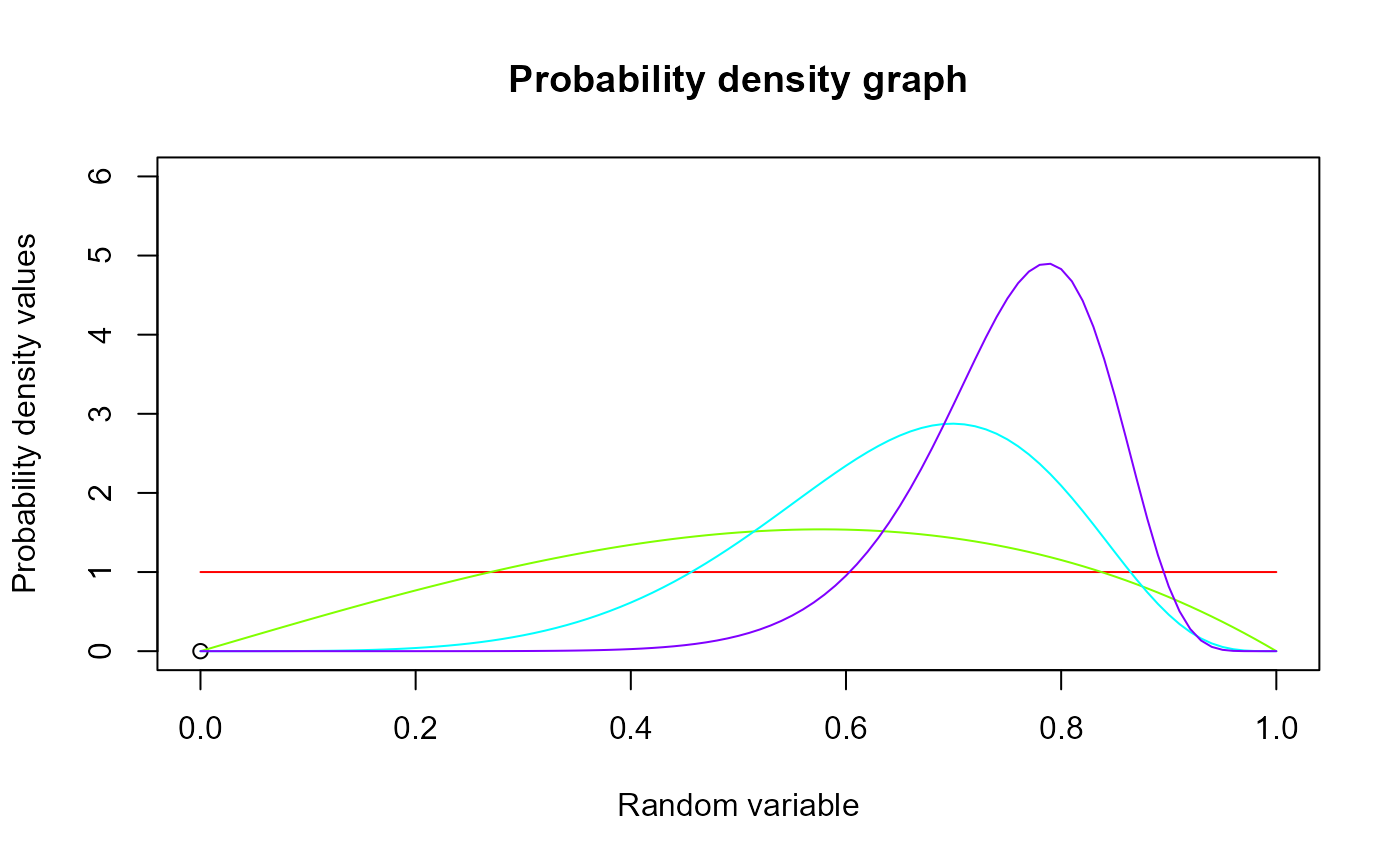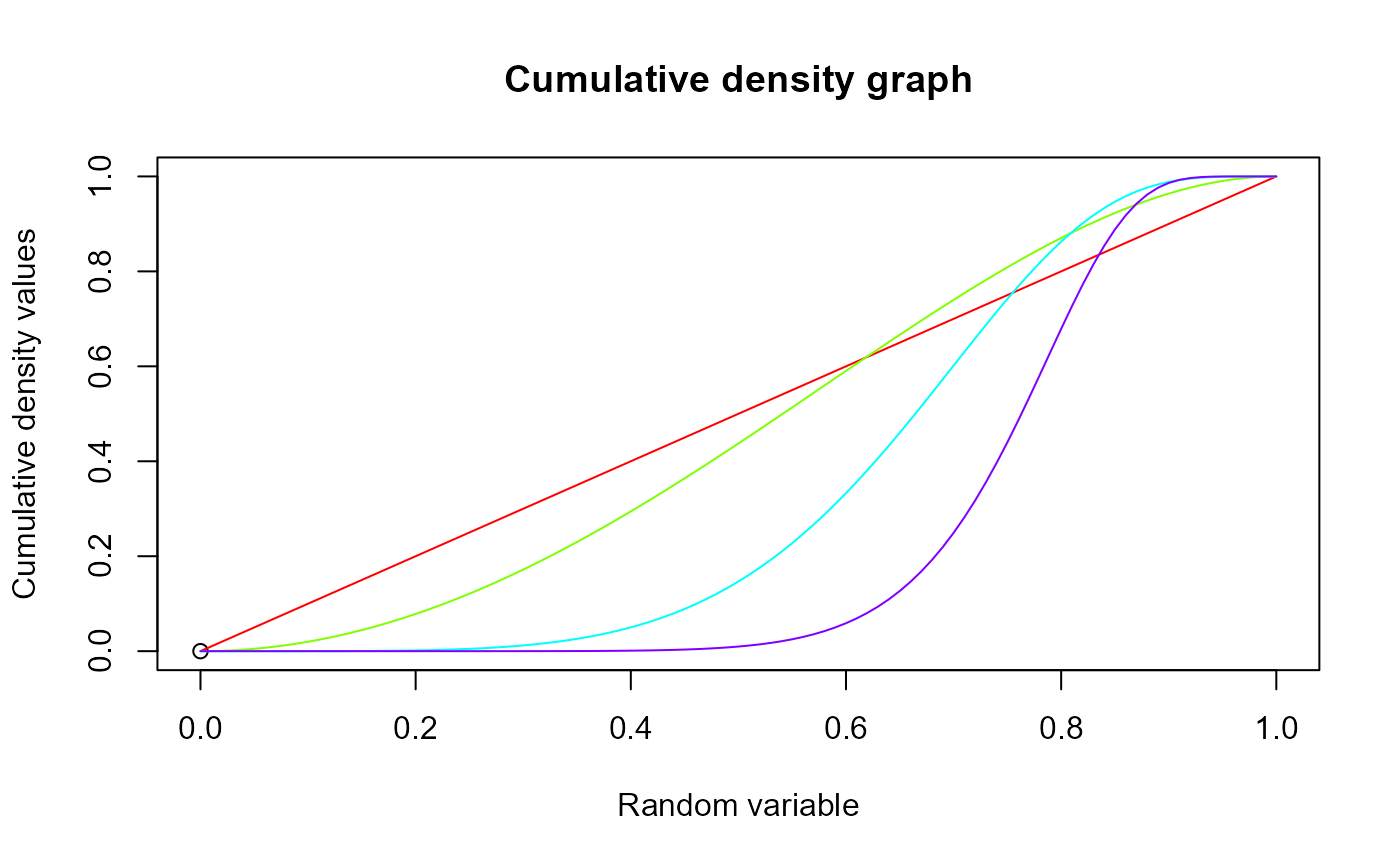These functions provide the ability for generating probability density values, cumulative probability density values and moment about zero values for the Kumaraswamy Distribution bounded between [0,1].
Arguments
- p
vector of probabilities.
- a
single value for shape parameter alpha representing as a.
- b
single value for shape parameter beta representing as b.
Value
The output of dKUM gives a list format consisting
pdf probability density values in vector form.
mean mean of the Kumaraswamy distribution.
var variance of the Kumaraswamy distribution.
Details
The probability density function and cumulative density function of a unit bounded Kumaraswamy Distribution with random variable P are given by
$$g_{P}(p)= abp^{a-1}(1-p^a)^{b-1} $$ ; \(0 \le p \le 1\) $$G_{P}(p)= 1-(1-p^a)^b$$ ; \(0 \le p \le 1\) $$a,b > 0$$
The mean and the variance are denoted by $$E[P]= bB(1+\frac{1}{a},b)$$ $$var[P]= bB(1+\frac{2}{a},b)-(bB(1+\frac{1}{a},b))^2$$
The moments about zero is denoted as $$E[P^r]= bB(1+\frac{r}{a},b)$$ \(r = 1,2,3,...\)
Defined as \(B(a,b)\) is the beta function.
NOTE : If input parameters are not in given domain conditions necessary error messages will be provided to go further.
References
Kumaraswamy P (1980). “A generalized probability density function for double-bounded random processes.” Journal of hydrology, 46(1-2), 79--88. Jones MC (2009). “Kumaraswamy’s distribution: A beta-type distribution with some tractability advantages.” Statistical methodology, 6(1), 70--81.
Examples
#plotting the random variables and probability values
col <- rainbow(4)
a <- c(1,2,5,10)
plot(0,0,main="Probability density graph",xlab="Random variable",ylab="Probability density values",
xlim = c(0,1),ylim = c(0,6))
for (i in 1:4)
{
lines(seq(0,1,by=0.01),dKUM(seq(0,1,by=0.01),a[i],a[i])$pdf,col = col[i])
}
 dKUM(seq(0,1,by=0.01),2,3)$pdf #extracting the probability values
#> [1] 0.000000000 0.059988001 0.119904019 0.179676146 0.239232614 0.298501875
#> [7] 0.357412666 0.415894084 0.473875661 0.531287429 0.588060000 0.644124631
#> [13] 0.699413299 0.753858776 0.807394694 0.859955625 0.911477146 0.961895914
#> [19] 1.011149741 1.059177659 1.105920000 1.151318461 1.195316179 1.237857806
#> [25] 1.278889574 1.318359375 1.356216826 1.392413344 1.426902221 1.459638689
#> [31] 1.490580000 1.519685491 1.546916659 1.572237236 1.595613254 1.617013125
#> [37] 1.636407706 1.653770374 1.669077101 1.682306519 1.693440000 1.702461721
#> [43] 1.709358739 1.714121066 1.716741734 1.717216875 1.715545786 1.711731004
#> [49] 1.705778381 1.697697149 1.687500000 1.675203151 1.660826419 1.644393296
#> [55] 1.625931014 1.605470625 1.583047066 1.558699234 1.532470061 1.504406579
#> [61] 1.474560000 1.442985781 1.409743699 1.374897926 1.338517094 1.300674375
#> [67] 1.261447546 1.220919064 1.179176141 1.136310809 1.092420000 1.047605611
#> [73] 1.001974579 0.955638956 0.908715974 0.861328125 0.813603226 0.765674494
#> [79] 0.717680621 0.669765839 0.622080000 0.574778641 0.528023059 0.481980386
#> [85] 0.436823654 0.392731875 0.349890106 0.308489524 0.268727501 0.230807669
#> [91] 0.194940000 0.161340871 0.130233139 0.101846216 0.076416134 0.054185625
#> [97] 0.035404186 0.020328154 0.009220781 0.002352299 0.000000000
dKUM(seq(0,1,by=0.01),2,3)$mean #extracting the mean
#> [1] 0.4571429
dKUM(seq(0,1,by=0.01),2,3)$var #extracting the variance
#> [1] 0.04102041
#plotting the random variables and cumulative probability values
col <- rainbow(4)
a <- c(1,2,5,10)
plot(0,0,main="Cumulative density graph",xlab="Random variable",ylab="Cumulative density values",
xlim = c(0,1),ylim = c(0,1))
for (i in 1:4)
{
lines(seq(0,1,by=0.01),pKUM(seq(0,1,by=0.01),a[i],a[i]),col = col[i])
}
dKUM(seq(0,1,by=0.01),2,3)$pdf #extracting the probability values
#> [1] 0.000000000 0.059988001 0.119904019 0.179676146 0.239232614 0.298501875
#> [7] 0.357412666 0.415894084 0.473875661 0.531287429 0.588060000 0.644124631
#> [13] 0.699413299 0.753858776 0.807394694 0.859955625 0.911477146 0.961895914
#> [19] 1.011149741 1.059177659 1.105920000 1.151318461 1.195316179 1.237857806
#> [25] 1.278889574 1.318359375 1.356216826 1.392413344 1.426902221 1.459638689
#> [31] 1.490580000 1.519685491 1.546916659 1.572237236 1.595613254 1.617013125
#> [37] 1.636407706 1.653770374 1.669077101 1.682306519 1.693440000 1.702461721
#> [43] 1.709358739 1.714121066 1.716741734 1.717216875 1.715545786 1.711731004
#> [49] 1.705778381 1.697697149 1.687500000 1.675203151 1.660826419 1.644393296
#> [55] 1.625931014 1.605470625 1.583047066 1.558699234 1.532470061 1.504406579
#> [61] 1.474560000 1.442985781 1.409743699 1.374897926 1.338517094 1.300674375
#> [67] 1.261447546 1.220919064 1.179176141 1.136310809 1.092420000 1.047605611
#> [73] 1.001974579 0.955638956 0.908715974 0.861328125 0.813603226 0.765674494
#> [79] 0.717680621 0.669765839 0.622080000 0.574778641 0.528023059 0.481980386
#> [85] 0.436823654 0.392731875 0.349890106 0.308489524 0.268727501 0.230807669
#> [91] 0.194940000 0.161340871 0.130233139 0.101846216 0.076416134 0.054185625
#> [97] 0.035404186 0.020328154 0.009220781 0.002352299 0.000000000
dKUM(seq(0,1,by=0.01),2,3)$mean #extracting the mean
#> [1] 0.4571429
dKUM(seq(0,1,by=0.01),2,3)$var #extracting the variance
#> [1] 0.04102041
#plotting the random variables and cumulative probability values
col <- rainbow(4)
a <- c(1,2,5,10)
plot(0,0,main="Cumulative density graph",xlab="Random variable",ylab="Cumulative density values",
xlim = c(0,1),ylim = c(0,1))
for (i in 1:4)
{
lines(seq(0,1,by=0.01),pKUM(seq(0,1,by=0.01),a[i],a[i]),col = col[i])
}
 pKUM(seq(0,1,by=0.01),2,3) #acquiring the cumulative probability values
#> [1] 0.000000000 0.000299970 0.001199520 0.002697571 0.004792324 0.007481266
#> [7] 0.010761167 0.014628088 0.019077382 0.024103701 0.029701000 0.035862542
#> [13] 0.042580906 0.049847997 0.057655050 0.065992641 0.074850697 0.084218508
#> [19] 0.094084732 0.104437416 0.115264000 0.126551336 0.138285700 0.150452806
#> [25] 0.163037823 0.176025391 0.189399636 0.203144190 0.217242210 0.231676393
#> [31] 0.246429000 0.261481874 0.276816462 0.292413838 0.308254724 0.324319516
#> [37] 0.340588302 0.357040896 0.373656856 0.390415514 0.407296000 0.424277274
#> [43] 0.441338152 0.458457333 0.475613434 0.492785016 0.509950617 0.527088785
#> [49] 0.544178110 0.561197257 0.578125000 0.594940258 0.611622130 0.628149931
#> [55] 0.644503231 0.660661891 0.676606099 0.692316417 0.707773813 0.722959704
#> [61] 0.737856000 0.752445144 0.766710156 0.780634672 0.794202997 0.807400141
#> [67] 0.820211870 0.832624752 0.844626203 0.856204533 0.867349000 0.878049854
#> [73] 0.888298390 0.898086996 0.907409210 0.916259766 0.924634649 0.932531150
#> [79] 0.939947921 0.946885026 0.953344000 0.959327906 0.964841391 0.969890743
#> [85] 0.974483952 0.978630766 0.982342755 0.985633371 0.988518007 0.991014061
#> [91] 0.993141000 0.994920422 0.996376121 0.997534153 0.998422901 0.999073141
#> [97] 0.999518110 0.999793575 0.999937901 0.999992119 1.000000000
mazKUM(1.4,3,2) #acquiring the moment about zero values
#> [1] 0.6428571
mazKUM(2,2,3)-mazKUM(1,2,3)^2 #acquiring the variance for a=2,b=3
#> [1] 0.04102041
#only the integer value of moments is taken here because moments cannot be decimal
mazKUM(1.9,5.5,6)
#> [1] 0.6551253
pKUM(seq(0,1,by=0.01),2,3) #acquiring the cumulative probability values
#> [1] 0.000000000 0.000299970 0.001199520 0.002697571 0.004792324 0.007481266
#> [7] 0.010761167 0.014628088 0.019077382 0.024103701 0.029701000 0.035862542
#> [13] 0.042580906 0.049847997 0.057655050 0.065992641 0.074850697 0.084218508
#> [19] 0.094084732 0.104437416 0.115264000 0.126551336 0.138285700 0.150452806
#> [25] 0.163037823 0.176025391 0.189399636 0.203144190 0.217242210 0.231676393
#> [31] 0.246429000 0.261481874 0.276816462 0.292413838 0.308254724 0.324319516
#> [37] 0.340588302 0.357040896 0.373656856 0.390415514 0.407296000 0.424277274
#> [43] 0.441338152 0.458457333 0.475613434 0.492785016 0.509950617 0.527088785
#> [49] 0.544178110 0.561197257 0.578125000 0.594940258 0.611622130 0.628149931
#> [55] 0.644503231 0.660661891 0.676606099 0.692316417 0.707773813 0.722959704
#> [61] 0.737856000 0.752445144 0.766710156 0.780634672 0.794202997 0.807400141
#> [67] 0.820211870 0.832624752 0.844626203 0.856204533 0.867349000 0.878049854
#> [73] 0.888298390 0.898086996 0.907409210 0.916259766 0.924634649 0.932531150
#> [79] 0.939947921 0.946885026 0.953344000 0.959327906 0.964841391 0.969890743
#> [85] 0.974483952 0.978630766 0.982342755 0.985633371 0.988518007 0.991014061
#> [91] 0.993141000 0.994920422 0.996376121 0.997534153 0.998422901 0.999073141
#> [97] 0.999518110 0.999793575 0.999937901 0.999992119 1.000000000
mazKUM(1.4,3,2) #acquiring the moment about zero values
#> [1] 0.6428571
mazKUM(2,2,3)-mazKUM(1,2,3)^2 #acquiring the variance for a=2,b=3
#> [1] 0.04102041
#only the integer value of moments is taken here because moments cannot be decimal
mazKUM(1.9,5.5,6)
#> [1] 0.6551253
